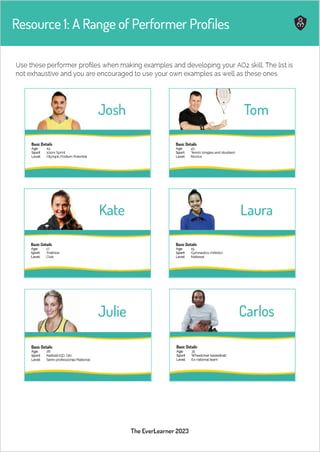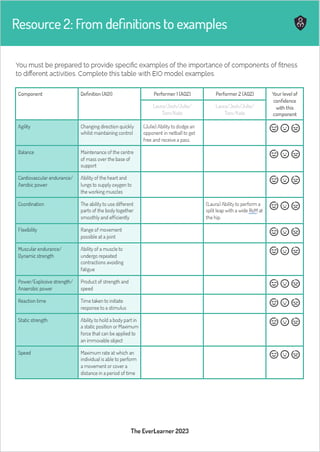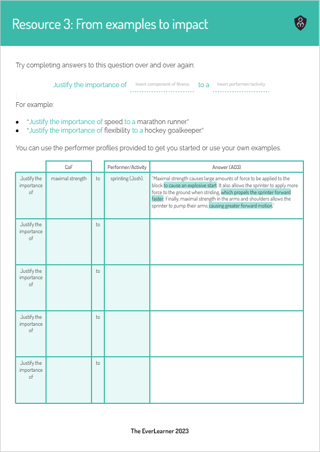Introducing... The PE Data Centre!!
Dear colleague,
I am assuming that you are a PE teacher, school-based manager of a PE course or a PE student. Perhaps you are a client of my business, TheEverLearner.com. Perhaps you are not. Regardless, I want to address you directly and announce what is, in my opinion, a very exciting development to my work.
In September 2023, I will be launching the inaugural pages of The PE Data Centre. These pages will contain live, up-to-date information about PE teaching, PE learning, PE courses and PE issues. The idea of the PE Data Centre is that the PE community can visit and acquire completely objective, non-sponsored data about learning in the domain of physical education.
The scope of The PE Data Centre is potentially huge. Therefore, when it is launched, it will be so with a narrow range of data and, as time progresses, the data will be expanded. The objective will be to share the highest-level, most macroscopic PE data alongside the most microscopic PE data. These data sources will be present to all PE educators and students to gain insights and feedback, as well as being used as a guide and a strategy.
So, what will The PE Data Centre be like on day 1?
I have decided to focus the initial data sources on qualification-based PE assessment processes. The initial provision will be designed to encourage PE teachers to plan their PE lessons with a key focus on assessment objectives and skills.
Let me provide an example:
Let’s say that you are a teacher of AQA GCSE PE 9-1 and you are planning a lesson on the components of fitness. You would be able to visit the PE Data Centre and analyse the data *trends for this specific topic:
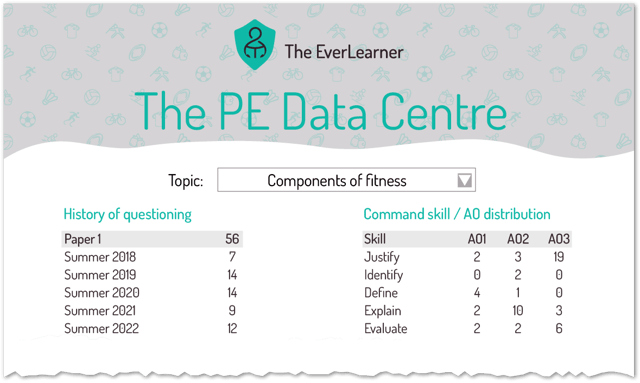
*2023 data to be added when available.
Based on this data, the PE Data Centre will make the following recommendations to the PE teacher:
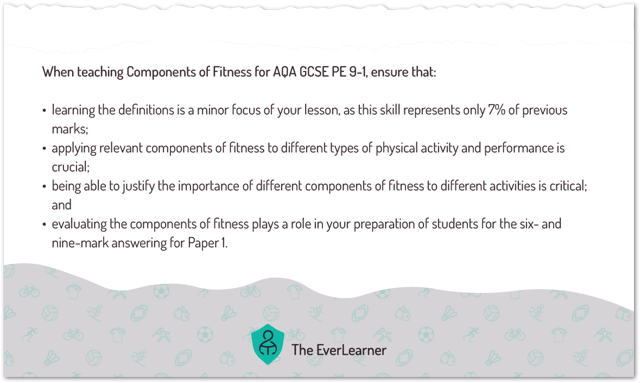
From here, the teacher can plan their learning resources for this particular topic to achieve both the knowledge and the skills described above. For example, a teacher may choose to provide resources such as these (you can get them for FREE by clicking the images):
I would like you to reflect on how “sharp” these resources and experiences are for a PE student in this context. Rather than spending too much time on AO1 knowledge, the experience is structured around where more marks are likely to come from. Furthermore, emphasis has shifted and sits with the learner. In a lesson utilising these resources, the from-the-front delivery time is likely to be minimal and the student activity phases should be greater. It may even be the case that these ideas can be represented through practical experiences within the theory lesson.
Now, imagine you had this data for every lesson that you teach. How would you use that data? How would it inform your practice? What might happen to the time spent in lessons on more rather than less relevant skills and resources? These are all excellent questions to ask and The PE Data Centre will allow you to answer them.
So, The PE Data Centre is just about skills?
No, the PE Data Centre is about every quantitative measure possible. What I have described above is simply one tiny example of what data might be able to help us with. I have many, many examples of the types of data that we may be able to provide you with but here’s a very limited description of just a few:
- Data relating to student external-exam performance on specific writing skills.
- Data related to student external-exam performance on specific content areas.
- Data related to student external-exam performance on different assessment objectives.
- Data related to historic grade boundaries.
- Data related to objective comparisons between equivalent exam boards.
The idea is that, over time, PE teachers can lean on The PE Data Centre for reliable, objective data that is published in a format that is accessible and meaningful.
So, on what principles will The PE Data Centre operate?
There are four principles to The PE Data Centre and they are:
|
Principle 1 |
LIVE DATA All data presented within The PE Data Centre is live, volatile and updated in the appropriate timescale |
|
Principle 2 |
TRUSTWORTHY DATA All data within The PE Data Centre is presented objectively in the absence of any external affiliation, sponsorship or endorsement. |
|
Principle 3 |
RIGHT FIRST TIME All data presented in The PE Data Centre will help PE teachers and learners “get it right the first time”, avoiding the need for cycles of trial and error. |
|
Principle 4 |
MINIMISE ERRORS All data presented in The PE Data Centre will allow PE teachers and students to minimise and eradicate assumptions and errors from their programmes. |
Conclusion
All in all, The PE Data Centre will allow PE teachers to sharpen their practices based on the exact statistics that they require without the need for endless searching and collating. Whether you wish to compare PE course popularity, review commonly and uncommonly assessed topics or identify the key skills that your students need to develop, The PE Data Centre will be constantly available to support you make those informed decisions.
Thank you for reading. Your feedback is welcome.
%20Text%20(Violet).png)
